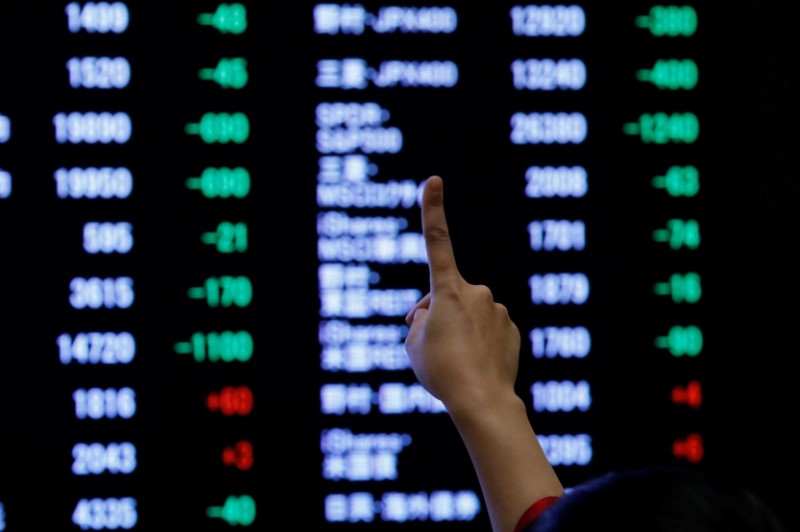By Hideyuki Sano and Tomo Uetake
TOKYO (Reuters) - Asian shares dipped on Tuesday, running out of steam after a brief rally sparked by hopes that Washington and Beijing may be inching towards a trade deal and that U.S. Federal Reserve would halt its tightening if economic growth slows further.
MSCI's broadest index of Asia-Pacific shares outside Japan (MIAPJ0000PUS) reversed from early gains to slip 0.2 percent, dragged lower by falls in China (SSEC) (CSI300) and Taiwan (TWII), while Japan's Nikkei (N225) rose 0.8 percent.
Financial spreadbetters expect a mixed start in Europe, with Germany's DAX (DAX) tipped to open 43 points higher at 10,790, Paris's CAC 40 (FCHI) expected to rise 32 points to 7,751, while London's FTSE (FTSE) was seen dropping 31 points to 6,778.
"Market pessimism has been rolled back, partly helped by hopes for the U.S.-China trade talks. But many investors are still trying to play it safe and it is yet to be seen whether the recovery continues, or ends up as a short-term relief rally," said Masanari Takada, cross-assets strategist at Nomura Securities.
On Wall Street, the S&P 500 (SPX) gained 0.7 percent on Monday following 3.4 percent surge on Friday, with Amazon.com (O:AMZN) and Netflix (O:NFLX) leading the rally. (N)
Gains in tech names allayed some fears, sparked by Apple's sales warnings last week (O:AAPL), that the high-flying sector is starting to be hurt by the Sino-U.S. trade war.
U.S. Commerce Secretary Wilbur Ross predicted on Monday that Beijing and Washington could reach a trade deal that "we can live with" as dozens of officials from the world's two largest economies resumed talks in a bid to end their trade dispute.
China's Foreign Ministry said Beijing had the "good faith" to work with the United States to resolve trade frictions, but many analysts doubt the two sides can reach a comprehensive agreement on all of the divisive issues before a March deadline.
Investors also continued to buy battered stocks in response to strong U.S. job data on Friday and comments by Fed Chairman Jerome Powell that he was aware of the risks and would be patient and flexible in policy decisions this year.
Powell's comments have eased market concerns that the U.S. central bank might ignore signs of an economic slowdown and stick to its script of two rate hikes this year.
"Various concerns markets had earlier are receding for now. Still, there's no denying that U.S. earning momentum is slowing," said Hirokazu Kabeya, chief global strategist at Daiwa Securities.
"Ultimately we need to see whether upcoming earnings reports can dispel market concerns."
Analysts estimate S&P 500 companies will increase their fourth-quarter earnings per share by 15 percent from a year earlier, down from 20 percent growth seen three months ago, according to Refinitiv IBES data.
The estimate for 2019 profit growth has fallen to about 6.9 percent from 10.2 percent. The picture is murkier for tech firms, whose earning growth estimates have fallen to 2.7 percent from 8.5 percent.
"There have long been suspicions that U.S. tech companies might be overvalued. And in a way Apple gave markets confirmation," said Kazushige Kaida, head of forex at State Street (NYSE:STT).
"There are worries more tech companies may issue profit warnings, which means there will remain a pressure on U.S. high-tech shares, and on the dollar/yen."
The dollar traded at 108.78 yen
The U.S. dollar is losing momentum as investors wind back expectations of rate hikes and a future widening in its yield advantage.
But conditions in most other developed economies aren't much to write home about, either, potentially limiting the upside for other major currencies.
The euro slipped 0.2 percent to $1.1454 (EUR=). The British pound traded flat at $1.2780
British and European officials are discussing the possibility of extending Britain's formal notice to withdraw from the European Union amid fears a Brexit deal will not be approved by March 29, The Daily Telegraph reported, citing unidentified sources.
In contrast, the Canadian dollar hit one-month highs, having gained 2.7 percent in the past five days on gains in oil prices and on speculation the Bank of Canada will stick this week to its plan to raise interest rates to a neutral range. [CAD/] It last stood at 1.3272 per U.S. dollar
Emerging market currencies also benefited from a weak dollar, with MSCI emerging market currency index (MIEM00000CUS) rising to levels last seen in late July.
The 10-year U.S. Treasuries yield (US10YT=RR) bounced back to 2.687 percent, from Friday's low of 2.543 percent, a trough last seen almost a year ago. Still, that is more than 50 basis points below its October peak of 3.261 percent.
Fed funds rate futures <0#FF:> now price in a slim chance of a rate cut this year.
Oil prices were stable on Tuesday, supported by hopes for Sino-U.S. trade talks in Beijing and a Wall Street Journal report that Saudi Arabia is planning to cut crude exports to around 7.1 million barrels per day (bpd) by the end of January.

Both U.S. West Texas Intermediate (WTI) crude (CLc1) futures and International Brent crude futures (LCOc1) stayed flat at $48.51 and $57.30 per barrel, respectively. [O/R]